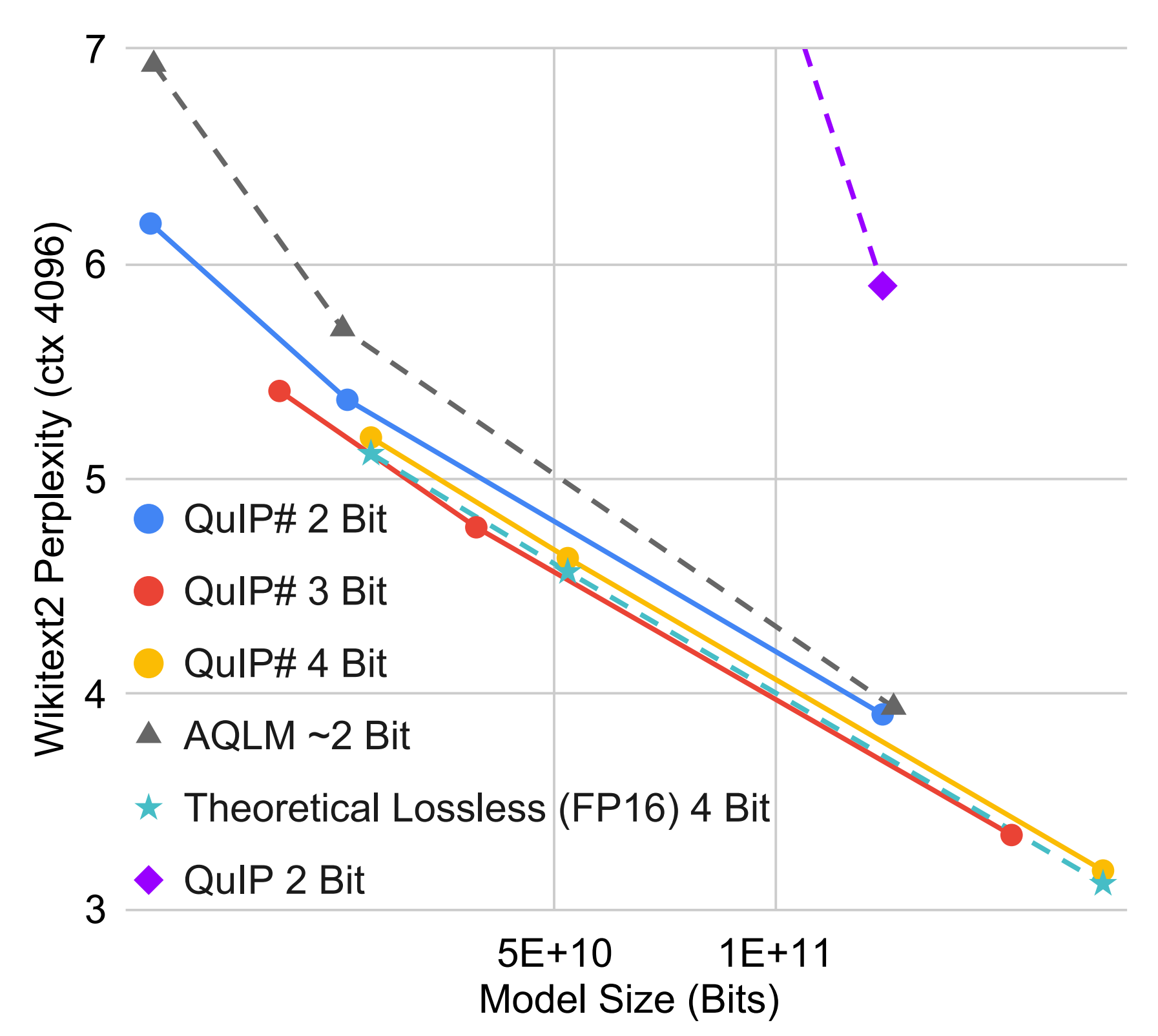QuIP#: Even Better LLM Quantization with Hadamard Incoherence and Lattice Codebooks [arXiv]
This repository contains the official code for QuIP#, a weight-only post-training quantization method that achieves state-of-the-art performance in extreme compression (
We provide a full suite of 2, 3, and 4 bit Llama models quantized using QuIP# here. This codebase contains code that allows users to quantize and deploy their own models as well as CUDA kernels that accelerate inference for QuIP# models. Please open a GitHub ticket if you have any questions about the code or QuIP# in general.
| Method | Precision | Wiki |
C4 (c4_new) |
ArcE |
PiQA |
|---|---|---|---|---|---|
| Native | 16 bit | 3.120 | 5.533 | 0.597 | 0.809 |
| OPTQ | 3 bit | 4.577 | 6.838 | 0.544 | 0.786 |
| OPTQ | 2 bit | 109.820 | 62.692 | 0.253 | 0.505 |
| QuIP | 2 bit | 5.574 | 8.268 | 0.544 | 0.751 |
| QuIP# | 2 bit | 3.907 | 6.248 | 0.591 | 0.794 |
- We released a preprint of QuIP# here. The old blog post has not been updated so do not refer to that.
- The latest version of this codebase has been significantly revamped and cleaned up. It should be significantly easier to quantize new models. Make sure to pull from the repo to get the latest improvements to QuIP#. Better documentation will come soon.
- QuIP# now includes a fine-tuning algorithm that further improves quantization quality. The Llama models on the HF repo have been updated with new models quantized with fine-tuning. These models are fully compatible with the old code. The Openhermes and Mistral models have not been requantized with fine-tuning; we will update those in the near future.
- Clone the repo
- Install the requirements via
pip install -r requirements.txt. You may want to use the official pytorch commands to get the CUDA versions. - Build and install the matmul CUDA kernels. (
cd quiptools && python setup.py install && cd ../)
Example quantization scripts for the Llama family of models are located in quantize_llama. Follow these scripts to use QuIP# on other architectures. Within quantize_llama:
hessian_offline_llama.pycontains code to generate model Hessians. Hessian calculation uses afp64accumulator for numerical accuracy. Running this script on a device with slowfp64capabilities will take longer. The HF repo includes pregenerated Hessians for a variety of models.--batch_sizeBatch size per GPU. Tune so you don't run out of memory.--devset_sizeSize of devset to use for Hessian generation.--ctx_sizeContext size (sequence length) to use for Hessian generation.--base_modelFull precision HF model.
quantize_finetune_llama.pycontains code to quantize llama with fine-tuning ("fine-tuning during quantization" in the paper).- To reproduce earlier QuIP# results without fine-tuning, pass
--ft_epochs 0 --save_pathOutput path.--base_modelFull precision HF model. For Llama 1, we provide weights atrelaxml/Llama-1-<7,13,30,65>b-hf.--hessian_pathOffline Hessians. We provide precomputed Hessians at repo_id'srelaxml/Hessians*-<n>. These Hessians were computed withnsamples and the context length and attention mask used to train the original model. To download them, runpython scripts/download_hf.py --folder_path <local path to save Hessians> --repo_id <repo_id> --read_token <huggingface read token>.--codebookCodebook. UseE8P12for 2 bits,E8P12RVQ3Bfor 3 bits, andE8P12RVQ4Bfor 4 bits.--scale_overrideand--resid_scale_override. Post-incoherence processing scale overrides. We suggest using 0.9 forE8P12and the default scales for 3 and 4 bit models. You may want to manually tune these for your specific model.--ft*Various fine tuning arguments.--ft_grad_ckptturns on gradient checkpointing and--ft_train_modemanifests the full quantized matrix during fine-tuning. We recommend turning--ft_train_modeon if you have enough memory since it makes training go faster.
- To reproduce earlier QuIP# results without fine-tuning, pass
finetune_e2e_llama.pytunes the sign vectors (SU/SV), layernorms, and language model head of a given model (the second fine-tuning step in the paper). The arguments are similar toquantize_finetune_llama.py. You will need to convert the output of that script to a Hf model withhfize_llama.pybefore running this script. The HF-ized model should be passed in through--hf_path.hfize_llama.pyconverts a quantized model to the HF format.
The scripts in quantize_llama are written with the Llama architecture in mind.
However, QuIP# is adaptable to any architecture with linear layers.
To use QuIP# on a new architecture, identify the relevant linear layers and update the scripts in quantize_llama.
Feel free to open a GitHub issue if you run into issues.
eval contains evaluation scripts. These scripts may need CUDA_VISIBLE_DEVICES=0 if you run into CUDA errors due to how HF accelerate works.
eval_ppl.pycalculates perplexity on Wikitext2 and C4.eval_zeroshot.pycalculates performance on zeroshot tasks.eval_speed.pytimes the forward pass for one token.
eval/interactive_gen.py contains a very simple interactive generation script.
This script is very rudimentary and you may want to write your own - all it does is call HF's .generate() function.
HF generate does not currently work with CUDA graphs. Thus, this script will be very slow since most of the time is spent on kernel launches. We expect better support for CUDA graphs with HF in transformers 4.38, which should come out in less than a month.
We provide quantized models available on HF.
To use them, pass the given HF repo_id to --hf_path.
The 3 bit models are currently significantly slower than the 2 and 4 bit models during generation since we have not written an optimized matvec CUDA kernel for them yet.
We provide a wrapper class that integrates our models with CUDA graphs in model/graph_wrapper.py.
Currently, the torch CUDA graph implementation does not work with HF's .generate() function, but model calls with static input and output sizes can utilize the CUDA graph wrapper for better performance.
Most of our evaluation scripts use the graph wrapper by default unless the --no_use_cuda_graph flag is passed in.
Use of Llama models is governed by the Meta license available here. Use of Mistral models is governed by the Apache 2.0 license. Use of this code is governed by the GNU GPL v3 license.
If you found this work useful, please consider citing
@misc{tseng2024quip,
title={QuIP#: Even Better LLM Quantization with Hadamard Incoherence and Lattice Codebooks},
author={Albert Tseng and Jerry Chee and Qingyao Sun and Volodymyr Kuleshov and Christopher De Sa},
year={2024},
eprint={2402.04396},
archivePrefix={arXiv},
primaryClass={cs.LG}
}
